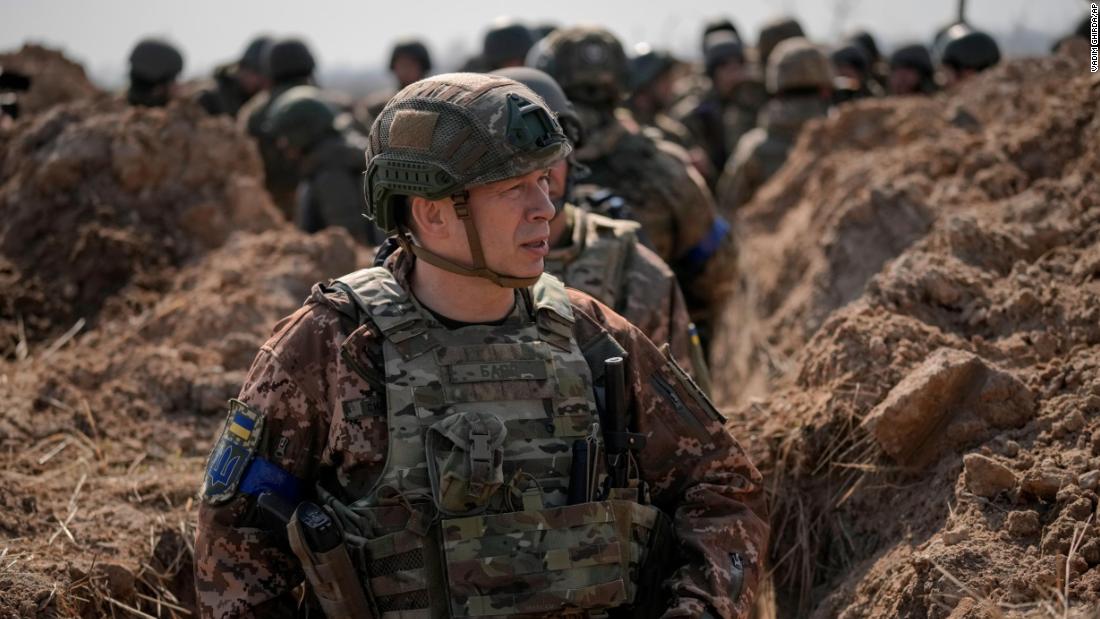US official warns the threat to Kyiv is not over, saying Moscow is repositioning forces after claiming troops will be scaled back
CNN —
President Joe Biden and other American officials voiced extreme caution Tuesday at signals Russia is scaling back its military operations near Kyiv, suggesting they were waiting to see stronger signs of de-escalation before making an assessment of Moscow’s intentions.
“We’ll see. I don’t read anything into it until I see what their actions are. We’ll see if they follow through what they’re suggesting,” Biden said at the White House, where officials were busy digesting intelligence and reports from the ground that Russian troops were moving their focus away from Ukraine’s capital toward other areas of the country.
Biden’s don’t-trust-but-verify approach reflects deep American skepticism at Russian President Vladimir Putin’s motives amid his monthlong invasion of Ukraine. While the US has observed movements of Russian forces away from Kyiv, there remains doubt the Russian assault on Ukraine will end soon.
Some Western officials viewed Russia’s moves as a mere tactical exercise amid a stalled campaign in Ukraine. US officials also said Russia could always reverse itself if the battle conditions allow.
Similarly, American officials appeared wary of voicing optimism about ongoing negotiations between Russia and Ukraine, which both sides suggested Tuesday had yielded progress. Instead, Biden was focused on ensuring the stringent sanctions regime he’s enacted with European allies remains in place as the hostilities continue.
Meeting in Istanbul, Russian and Ukrainian teams began outlining the contours of a settlement, including discussions over the status of Crimea, which Russia annexed in 2014, and Donbas, the eastern region that Russia claims is independent. Ukraine’s neutral status and international security guarantees are also up for discussion, as is a potential meeting between Putin and Ukrainian President Volodymyr Zelensky.
US officials have questioned Putin’s seriousness in negotiating an end to the violence from the start of the crisis. Some have also made plain they aren’t certain of Zelensky’s endgame in the talks and are wary of whatever concessions he may offer.
Speaking in the East Room alongside the visiting Singaporean Prime Minister, Biden said he’d discussed the nascent peace talks with European leaders on a 53-minute telephone call earlier in the day. He said there was a “consensus” among the leaders to “let’s just see what they have to offer. We’ll find out what they do.”
“In the meantime, we’re going to continue to keep strong the sanctions. We’re going to continue to provide the Ukrainian military with their capacity to defend themselves and we’re going to continue to keep a close eye on what’s going on,” Biden added.
Biden’s aides echoed his sentiment, saying that while there were signs of troop movements, a new strategy did not appear afoot.
“We have no reason to believe that they have adjusted, that they’ve adjusted that strategy,” White House communications director Kate Bedingfield said during a daily briefing. “Obviously, we continue to do everything we can to impose costs for this decision.”
Speaking on a diplomatic visit to Morocco, Secretary of State Antony Blinken cautioned the pullback of troops could amount to “a means by which Russia once again is trying to deflect and deceive people into thinking it’s not doing what it is doing.”
“If they somehow believe that an effort to subjugate ‘only’ – in quotation marks – the eastern part of Ukraine and the southern part of Ukraine can succeed, then once again they are profoundly fooling themselves,” Blinken said at a joint news conference with Moroccan Foreign Minister Nasser Bourita.
And the Pentagon cautioned that while “small numbers” of Russian forces have moved away from Kyiv “in the last day or so,” Russia can still inflict “massive brutality” on the city.
“We believe that this is a repositioning, not a real withdrawal, and that we all should be prepared to watch for a major offensive against other areas of Ukraine,” said Pentagon press secretary John Kirby at a briefing. “Nobody should be fooling ourselves by the Kremlin’s now recent claim that it will suddenly just reduce military attacks near Kyiv, or any reports that it’s going to withdraw all its forces.”
Kirby said that the number of Russian forces moving away from the Ukrainian capital is “not anywhere near the majority of what they have arrayed against Kyiv,” and that Russia has continued airstrikes against the city “even today.”
He added, “It does not mean that the threat to Kyiv is over.”
For its part, Moscow was quick to clarify its announced plans of deescalating near Kyiv did not amount to a ceasefire. Russian presidential aide Vladimir Medinsky told Russian state-owned channel RT the first step agreed by Russia in talks with Ukraine “concerns a gradual military de-escalation in two main directions, Kyiv and Chernihiv,” adding, “We understand that there are people in Kyiv who need to make decisions, so we do not want to expose this city to additional risk.”
Biden’s phone call with European allies came days after he had returned to Washington from a last-minute trip to Belgium and Poland meant to reinforce American commitment to the region’s security. He spoke with French President Emmanuel Macron, British Prime Minister Boris Johnson, German Chancellor Olaf Scholz and Italian Prime Minister Mario Draghi.
Macron in particular has acted as an interlocutor between Putin and the West, and the two men spoke Tuesday after the group call with Biden. The French President had warned against escalating the crisis after Biden said in Warsaw that Putin “cannot remain in power.”
The White House said that remark – which Biden sought to explain Monday as an emotional response to meeting with Ukrainian refugees in Warsaw – did not arise on his Tuesday morning phone call.
![]()


